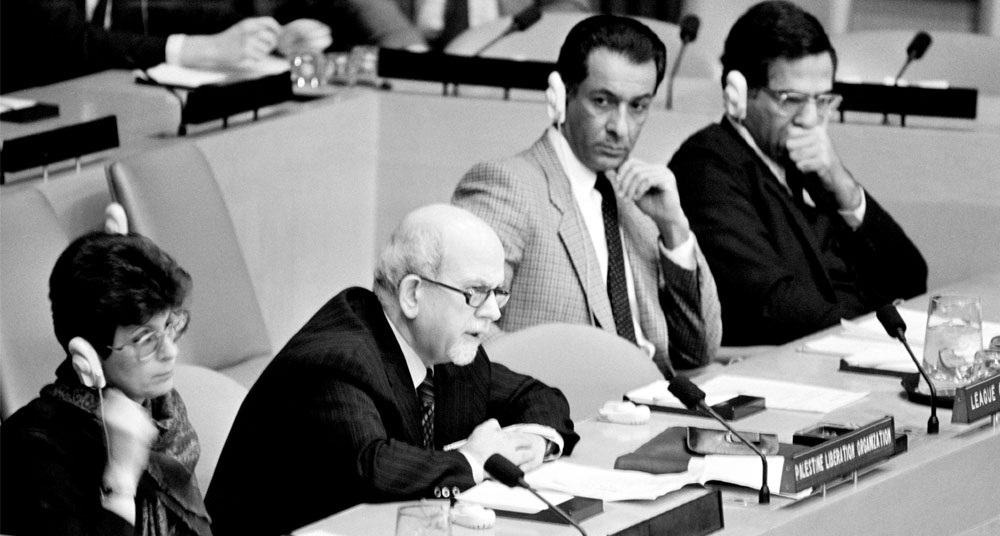Mandate and Objectives of the United Nations Committee on the Exercise
of the Inalienable Rights of the Palestinian People

8 January 1985 - Zehdi Labib Terzi (second from left), Permanent Observer of the Palestine Liberation Organization, addressing Committee first 1985 Meeting. UN Photo
The question of Palestine was first officially brought before the General Assembly in April 1947, upon a request by the United Kingdom following the termination of its League of Nations’ Mandate over Palestine. The Assembly decided to partition Palestine into two States, one Arab and one Jewish, with a special international régime for Jerusalem (resolution 181 (II) of 29 November 1947). Although the independence of the State of Israel was declared on 14 May 1948, the Arab State did not come into being as several wars were fought in the area and the Palestine problem continued to be discussed at the United Nations as part of the larger Middle East conflict or in its refugee or human rights aspects.
It was only in 1974, as a result of the June 1967 war and the continuing military occupation by Israel of the remainder of Mandate Palestine, that the question of Palestine was reintroduced in the Assembly’s agenda as a national question and the inalienable rights of the Palestinian people were reaffirmed and specified in resolution 3236 (XXIX) of 22 November 1974, as the right to self-determination without external interference; the right to national independence and sovereignty; and the right of Palestinians to return to their homes and property, from which they had been displaced and uprooted.
In its resolution 3376 (XXX) of 10 November 1975, the General Assembly decided to establish the Committee on the Exercise of the Inalienable Rights of the Palestinian People and requested it to recommend to the Assembly a programme of implementation to enable the Palestinian people to exercise its rights.
In its first report submitted to the Security Council in June 1976, the Committee proposed a two-phase plan for the return of Palestinians to their homes and property; a timetable for the withdrawal of Israeli forces from the occupied territories by 1 June 1977, with the provision, if necessary, of temporary peacekeeping forces to facilitate the process; an end to the establishment of settlements; recognition by Israel of the applicability of the Fourth Geneva Convention to the occupied territories pending withdrawal; and endorsement of the inherent right of Palestinians to self-determination, national independence and sovereignty in Palestine.
The Committee’s recommendations were not adopted by the Security Council, due to the negative vote of a permanent member, and have not been implemented. They were, however, endorsed by an overwhelming majority in the General Assembly, to which the Committee reports annually. The Assembly reaffirmed that a just and lasting peace in the Middle East could not be established without the attainment of the inalienable rights of the Palestinian people. The Assembly also requested the Committee to keep the situation relating to the question of Palestine under review and to report and make suggestions to the General Assembly or the Security Council, as appropriate, and to promote the greatest possible dissemination of information on its recommendations.
The mandates of the Committee, the Division and the Department of Global Communications were renewed on 30 November 2022 (A/RES/77/22), with amendment to review thereafter only as necessary.
Showing 10 documents of 20 found.

